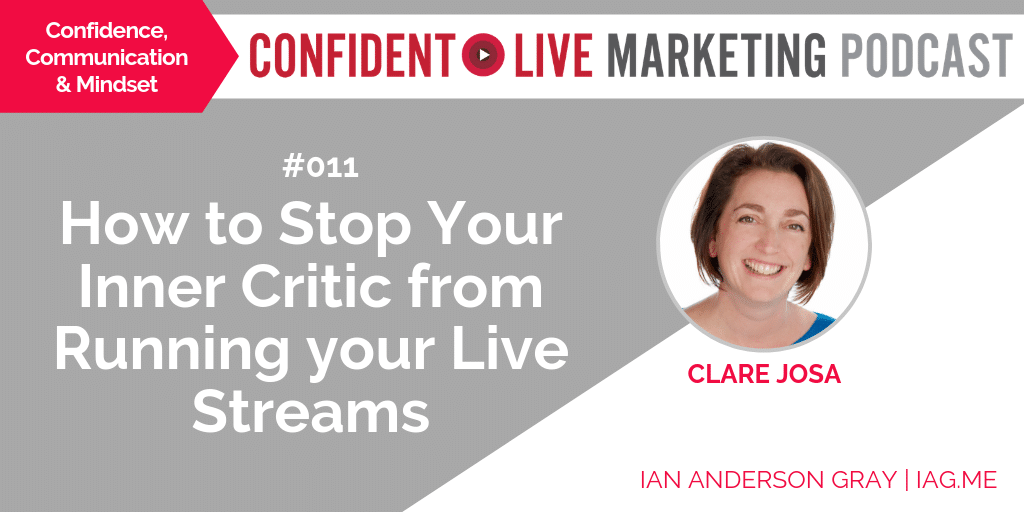How to Stop Your Inner Critic from Running Your Live Streams with Clare Josa
Confident Live Marketing Podcast
Episode 11
Episode Theme: Confidence & Mindset
August 2, 2019

Thank you to our podcast sponsors - Content 10x. They are a great re-purposing service that takes your one piece of content and repurposes it into an array of content for all the different social media platforms to help you to promote the original content.
In this episode, I speak to Clare Josa. Clare mentors business leaders to help them to ditch Imposter Syndrome and to clear their self-imposed glass ceilings. She is also the author of seven books and speaks internationally on how to change the world by changing yourself.
Having originally trained and qualified as a Mechanical Engineer, Clare became an NLP Trainer in 2003, specialising in the psychology and neuroscience of peak performance.
Clare’s Background
Clare started out studying Mechanical Engineering in Germany because she wanted to know how car engines worked! After graduating she returned to the UK and spent 10 years specialising in diesel engine manufacture, lean manufacturing and Six Sigma.
She also specialised in looking at what happened when a process broke down and you had quality issues, and how you could achieve a permanent fix. It was about quality in designing so you can’t get it wrong in manufacture.
There came a point when she realised she liked to make people smile. She started studying psychology and went travelling, then came back to work for Dyson, and got re-qualified in market research. She worked on helping to convert market research speak into something that engineers could understand.
Then in 2003, she decided to start her own business and worked on her NLP qualification. While she has worked with a lot of entrepreneurs over the years, today she works a lot more with corporate clients and her passion project now is “Leading from your heart, in a head-based world.”
#1 Do you still get nervous when you go live?
I much prefer live to pre-recorded video to be honest. I “um” and “er” and hesitate so much more for recorded video than I do for live video! I much prefer live video because I feel like you are co-creating with the people who show up to be live with you.
#2 How would you define the ‘inner critic’? And why does it harm us?
Basically, it’s the internal self talk that you have. There is a bit of you that’s just running this commentary and over time these thoughts in your head become habits. We pick our favourites and they stick around. They become the stories we choose to feed our thoughts with - but then, not everyone thinks in words, some think in pictures or physical sensations.
Those who struggle most with their inner critic tend to be those that ‘hear’ it as a voice and more often than not, it tends to be the voice of someone in their life.
#3 Where does the inner critic come from?
I’ve done a lot of research on this and the conclusion I’ve come to is that it comes from early childhood when we start cognitive thinking.
As you get older and start to evaluate the world and realise that you are separate to your parents (at around the age from 7 to 9) - this is where the inner critic can really start to form. It’s also a point in our childhood where we start to be compared by our teachers to our fellow classmates. So what we are learning is the absolute seed of the inner critic - which is judgement.
And this is where cognitive thinking combines with judging. The difference here is between ‘evaluating’ and ‘judging’. When you are focussed on the judging bit - this is your inner critic.
#4 Is there something chemically happening to our brains when the inner critic kicks in?
There absolutely is. A good antidote to the inner critic is celebrating the micro-wins (i.e. the small things that do go well) and then say how can I make them even better? (Use AND and not BUT, as the brain is trained to ignore anything that was said before ‘but’ as it thinks it was all a lie.)
Your emotions are purely chemical reactions in your body. I trained with a Buddhist monk when I was becoming a meditation teacher and he said that “Any emotion, left to its own devices will pass through in under 60 seconds.”
A thought triggers the emotion through what’s called the autonomic nervous system (the bit that makes your heart beat and your hair grow) and then the emotion kicks off. This emotion then feeds the thought, that then triggers the stories…which then feeds the emotions. And that cycle goes on, and you start to feel those emotions in your body.
So when you are thinking that ‘mind story’ fear (the kind you make up) of what might go wrong - those will trigger the fear response in the body: the fright, flight, freeze. It triggers the chemical reactions which will release the cortisol and adrenalin (the “stress response”).
What it then does is say that every threat, whether imagined or physical, is treated as though it’s the saber-toothed tiger outside the entrance to your cave. It diverts the flow of blood from the bit of your brain that is really good at coming up with answers when Ian asks questions; from non-essential processes (like digestion) and gets you ready to fight or run and survive. And suddenly - a little bit of self-talk like “I’m going to go and do a livestream” becomes “what if I die doing a livestream?”
Your body kicks off the same chemical reactions as if that saber-toothed tiger is gently knocking on the door of your cave.
#5 It can happen that when you click to go live - your mind goes blank. Why does that happen?
This is that bit when you have hit that stress response and you don’t have access to the frontal cortex part to your brain (the one that comes up with the brilliant thinking). You are then rather stuck in the primal part of your brain that says: “I can’t think about this livestream right now, I have a saber-toothed tiger to deal with!’
I have a coping mechanism I use to help me when this happens. I have square notes where I write a couple of key points down about what it is that I want to communicate in my livestream. And if I do go blank - I am honest with my audience, and I just say I’ve gone blank, and I don’t want to waste your time, so I am going to just quickly look at my notes.
The other thing I would say is: avoid trying to communicate too much in a livestream. It’s different than a webinar. Rather, look at asking: what is the one thing that I want to get across; what is the one story I’m going to tell to do it; and what is the one action I want the audience to take? Write those three things down on your square bit of paper.
That helps your live become more conversational and relaxed with your audience.
Another tip is to do some slow breathing to help mitigate the stress response, it gets you back in your body and redirects your blood flow back to where you need it.
[More resources on breathing exercises for your livestream: listen my podcast called ‘How to Warm up Your Voice & Communicate With Confidence.’]
#6 Should you feel the fear? Dance with it? Push it away? What is your advice on how to deal with it?
There are two types of stress or fear:
Distress: Where things have just gotten out of control and you’ve trigged the fear response
Eustress: This is what you want, it’s the excitement adrenaline
I don't recommend 'feeling the fear and pushing on through’ - because what you are doing is forcing the emotions down - which makes the stress response worse. You are actually going to war with yourself - packing that ‘forcing’ on top of stress, on top of fear, and then the likelihood of you giving your best performance is really low.
What this will cause is more problems like mental health issues, relationship issues, physical health issues and more. What I would rather you do is look at clearing the fear and doing your live inspired, instead of scared.
#7 What should we be doing to prepare our minds before we hit the go-live button?
I would tell you to completely ignore your mind. I would go back to your body - do three big, deep breaths to get you present, in the moment, and out of your stressed head. Breath deep…in through the nose and out through the month. While you are breathing in, imagine you are taking a big breath of gentle confidence and then breathing out - letting go of any stress and worry.
By doing this you are influencing your nervous system to give you the clear thinking that you will need to be relaxed and have more confidence.
#8 How do you feel about getting audience feedback online vs on stage?
I like what you have been doing in presenting this podcast through the livestream. You are great at using people’s names, asking some specific questions to answer, and bringing in their queries/comments and using that and other little elements to engage your audience.
We must stop judging ourselves through the metrics of who watches our livestream, but rather look at the effect and impact the live has for people.
You never know who is watching or listening to you. Someone could watch or listen to you, but never actually engage online, but then you may hear from them weeks later.
On stage or in-person, you get immediate feedback and you know whether you are going in the right direction or not. Online is a little trickier!
#9 What should our long term strategy be to turn your inner critic into your biggest fan?
Firstly, a quick fix is my ABC strategy.
A - Accept
B - Breathe
C - Choose
Accept that it is an inner critic thought you are having.
Breathe in through your nose and out through your mouth, nice and slow.
Choose a thought to celebrate.
The inner critic is really a surface-level symptom of something that is happening at a much deeper level, so we need to work on more than just mindset work, as positive thinking alone is not going to do “the job” of getting rid of that inner critic.
I tend to work with clients on their identity level to help solve the inner critic (who are you, what sort of stories are you telling yourself about yourself at an identity level, what beliefs have you created based on this).
A big thank you to Clare for coming to speak to me on this episode. We could have talked for hours - this is just a fascinating subject and Clare is just such a fountain of knowledge and expertise.
You can find out more about her here:
Website: www.clarejosa.com
Workshop: ‘Is it finally time to tame your inner critic
Book: Ditching Imposter Syndrome



Comments